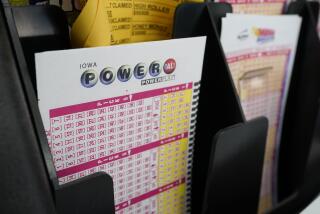Lottery Plans $1-Million ‘2nd Chance’
SAN FRANCISCO — The top California Lottery official Thursday apologized for selling game tickets after the big prizes had been claimed and announced a special $1-million “second-chance” drawing for anyone with tickets from past or current games.
In a bid to restore public confidence in the 15-year-old lottery, Chief Executive Joan Wilson said the agency has adopted the procedures of other states and will electronically notify retailers selling Scratchers to stop selling the instant tickets after the last big prize in a particular contest is won.
But the steps didn’t satisfy all critics, especially as lottery officials acknowledged for the first time that sales in some games had continued for as long as three years after the last big prizes were gone.
The changes are outlined in a “Dear Californians” letter mailed to nearly 19,000 retailers of Scratchers tickets and posted on the lottery’s Web site.
“The lottery deeply regrets having done anything that may make even one citizen lose confidence in the integrity of the games,” Wilson wrote in the letter.
The special drawing will be the first in the lottery’s history in which all nonwinning Scratchers tickets can be sent in. Wilson said she expects millions of entries during the February promotion, which will dole out $1 million in prizes ranging from $1,000 to $25,000.
The steps follow a report in The Times that the lottery allowed the sale of millions of $1, $2 and $3 tickets when there was no chance for big prizes of as much as $100,000.
The lottery conceded in written statements to The Times and in a Sacramento lawsuit that in 11 of 137 Scratchers games over the last five years, as many as 5% of the tickets were available for sale after the top prizes had been claimed. Data from before 1996 were not available.
It said that a total of $6.6 million worth could have been sold after that point, and that it distributed more than $800,000 in tickets for those games to stores after the fact.
‘There Was a Mistake Made’
In a joint interview Thursday, Wilson and her chief deputy, Dennis Sequiera, said that less than the $6.6 million in tickets were actually sold to consumers, because that figure includes damaged, free and unused tickets. They said they didn’t have a precise number yet.
“We’re not trying to hide anything,” Wilson said. “We know that there was a mistake made.”
Sequiera said that in the games where tickets were still being sent out to stores, the late sales lasted from several months to three years in one game. That game was a slow seller, with $93,000 worth of tickets involved.
The San Diego attorney who filed suit against the lottery’s late sale practices, Kevin Roddy, said that he wanted to know more about the new procedures and that the late ticket sales exceeded the amount in the makeup drawing.
“One million dollars is far less than the real amount of tickets they sold after prizes were gone,” said Roddy, who filed the suit in 2000 on behalf of San Francisco Scratchers player Amy Stanley.
Sequiera said that the lottery did not discover the problem until well after the suit was filed because it assumed that the chances of a game running too long were very small. Multiple top prizes are mixed throughout the Scratchers games, with most prize money distributed through smaller awards.
Battle Over Suit Continues
Many editions of Scratchers games run simultaneously and they are consistently the lottery’s most popular contests, racking up $11 billion in total sales. Net proceeds go to the state’s public schools.
In her letter, Wilson said the lottery began its new procedures immediately after discovering the late sales, some months after the lawsuit had been filed.
She stressed that in the 11 games at issue, smaller prizes were still available. “But even one mistake is very regrettable,” Wilson wrote. “All of us at the California Lottery are dedicated to making sure that the citizens of the state have the utmost faith and trust in their lottery.”
The lottery is continuing to fight the lawsuit in Sacramento, where it has argued that it is exempt from false-advertising laws because it is a public agency.
A judge has thrown out parts of the case seeking financial damages, but the court is still considering whether to order the lottery to take more corrective action. Sequiera said Thursday that the agency is doing enough.
“We have taken aggressive action, and it corrects the situation,” he said.
Wilson has served as the lottery’s top officer for 17 months, working under a five-member Lottery Commission, whose members are appointed by the governor.
More to Read
Inside the business of entertainment
The Wide Shot brings you news, analysis and insights on everything from streaming wars to production — and what it all means for the future.
You may occasionally receive promotional content from the Los Angeles Times.









